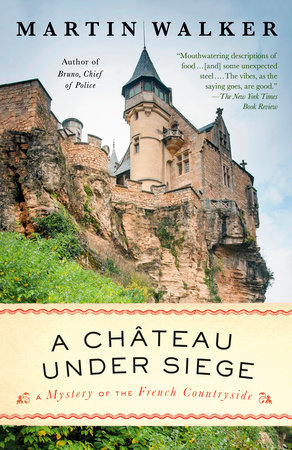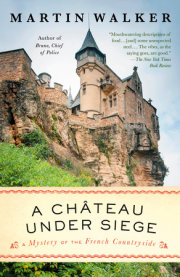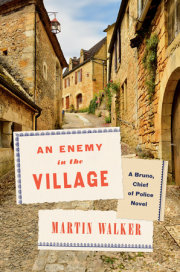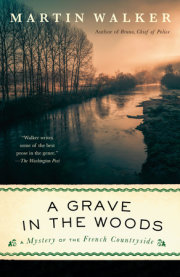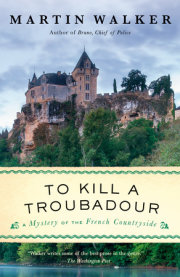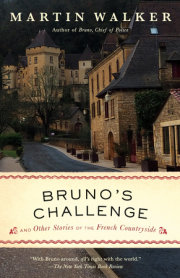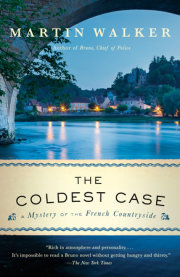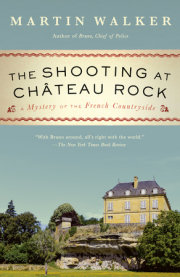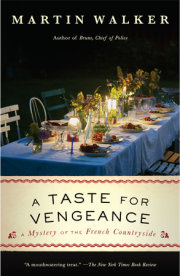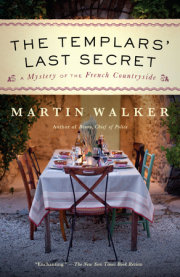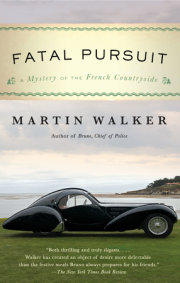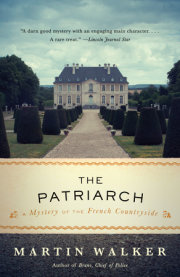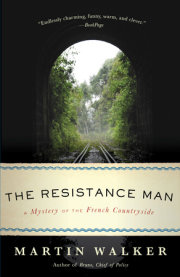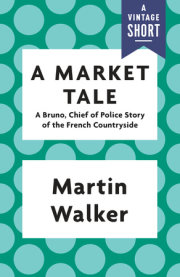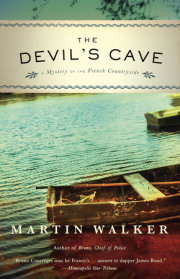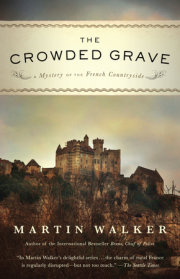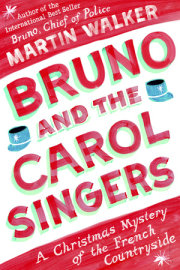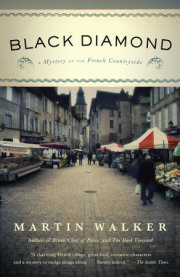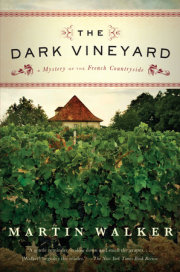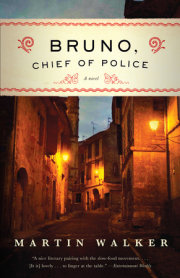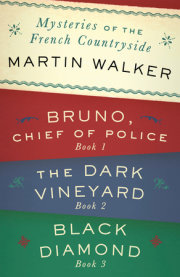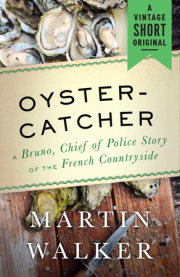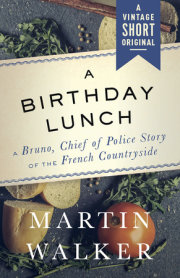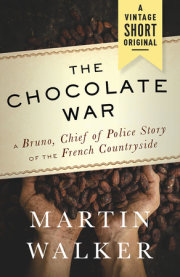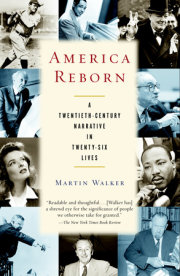Chapter 1
Bruno Courrèges, chief of police for the Vézère Valley in the Périgord region of France, was deeply fond of the medieval square of Sarlat, but he had never seen it from this angle before. He was seated among his friends on one of the top rows of benches, and it felt uncomfortably high. Erected each year for the town’s theater festival, the benches were being used for a new venture, the reenactment of the Battle of Sarlat in 1370, when the town had been liberated from English rule. As a former soldier, Bruno was interested to see how this mock battle would unfold.
“Sarlat was the traditional capital of the Périgord Noir dating back to Gallo-Roman times, and Charlemagne himself donated holy relics to the abbey here,” said Pamela. She sat on Bruno’s left and was reading aloud from a guidebook as Bruno gazed fondly at this former lover who had since become the closest female friend he’d ever known. “That’s how it became rich, attracting pilgrims who ensured its growing prosperity. Over time, the monks established eighty-five daughter churches whose parishes by the year 1200 stretched nearly two hundred kilometers to Toulouse.”
“All while preaching the virtues of poverty,” grumbled Gérard Mangin, sitting on Bruno’s right. As the mayor of St. Denis, Mangin had hired Bruno to be the town policeman more than ten years earlier, and Bruno, an orphan, sometimes thought of him as the father he had never known. The mayor was a staunch Republican who only went to church when baptisms, funerals or his civic duties required. Weddings, he believed, were civic events for him to officiate rather than any priest.
A dozen of Bruno’s friends from St. Denis were clustered around them. The baron, one of Bruno’s hunting partners, sat on the far side of Pamela. Fabiola, a local doctor, and her partner, Gilles, a journalist, were on the bench below, beside Bruno’s cousin, Alain, and Rosalie, the woman Alain would marry later that year once their twenty years’ service in the Armée de l’Air was complete. On the row below them were Miranda, Pamela’s partner in the riding school, and Miranda’s father, Jack Crimson, a retired British diplomat. The only one missing was Florence, a local science teacher, who had lost the toss of a coin with Miranda to see which of the two mothers would babysit their young children, all of them exhausted after a long day around Pamela’s pool.
It had been for Bruno a perfect day, undisturbed by any of the sudden crises that had ruined his previous Fridays and Sundays, nominally his days off. Three traffic accidents, two lost children and a drunken duel between two Dutch tourists in kayaks had consumed his supposed free time. But today had been spent in and around Pamela’s swimming pool with his friends, and while preparing lunch for them all, he’d enjoyed showing the children how to make deviled eggs.
They had watched him halve the hard-boiled eggs, scoop out the yolks, crush them with a fork and then make mayonnaise. He’d added a little red wine vinegar and some Dijon mustard, and then whipped up the mixture with a little sunflower oil until it slowly began to thicken. He added a squeeze of half a lemon and whisked some more until the mayonnaise reached the firmness he wanted. Next he used a fork to mix in the crumbled egg yolks, then scooped the egg and mayonnaise mix into a dozen of the eggs for the grown-ups. He asked the children how they liked their eggs. “With ketchup,” they replied, so Bruno put the remaining mayonnaise into a dish and showed them how to stir in ketchup until it turned pink. He added the crumbled yolks and scooped the mixture into the halved whites, and grinned as the kids darted away to show off their pink deviled eggs. He smiled to himself at the memory, until Pamela interrupted his thoughts to ask whether today’s planned reenactment was historically accurate.
“As usual, that depends on whose version of history you read,” the mayor said. “Only later did English and French historians make it a matter of national patriotism. At the time, most people in this region accepted that their local lord was the Duke of Aquitaine, who happened to be half English. And if he didn’t speak their language, nor did the king of France because everyone around here spoke Occitan. The English duke’s taxes were usually lower, and England was the main market for our wines.”
“Whoever built Sarlat, they left us a lovely town,” said Bruno. He never tired of visiting the old town, a jewel of medieval and Renaissance architecture so well preserved that it had become a mainstay of French historic films. Its markets and festivals for the local delicacies of truffles and foie gras were renowned. Sarlat was woven deeply into the history of France. It was lost and then liberated in the Hundred Years War against the English. It had again been a battlefield in the sixteenth century in France’s civil wars when Catholic fought Protestant so long and so bitterly that more than two million died—a tenth of the French population—from war and the plagues and famines the marauding armies brought in their wake.
Sarlat’s launch of this tourist event had certainly attracted great interest. There were TV cameras, radio and press reporters, and not an empty seat in the giant array of benches that had been erected in the main square. The town had provided a lavish budget for the medieval costumes and musicians to commemorate the great patriotic occasion, when the townsfolk of Sarlat had risen against the English from within while French troops stormed the gates.
The idea had been borrowed from the annual reenactment of the battle of Castillon in 1453, when the English army led by the renowned John Talbot, the Earl of Salisbury, had been decisively defeated. The rosbifs, as the French called their traditional enemies from across the Channel, had finally been ejected from southern and western France for good, with only the Channel port of Calais remaining in English hands for another hundred years. Every summer, the people of the town of Castillon, now known as Castillon-la-Bataille in commemoration of the victory, mounted a popular pageant. It featured crowd scenes and parades, knights in armor charging on horseback, picturesque tents and flags and the roar of the cannon that had been the key to the French victory, opening the way for the French to take the strategic port of Bordeaux, just a day’s march away.
As a former soldier, Bruno had always wondered why the name of Jean Bureau had been forgotten, since the great victory of Castillon had been his. As the Master of the Ordnance for the French king, Bureau had assembled three hundred cannon and mounted them behind a defensive ditch. The guns had a greater range than the longbows of the hitherto invincible English archers. It was, therefore, a battle which lent itself to reenactment. The English stopped to shoot their longbows, and the guns roared out and the archers began to fall. Then the English infantry launched their doomed assaults and the guns roared out again, and finally the French knights emerged on horseback for a triumphant charge.
It was all very simple for tourists to understand, all very scenic and with powerful sound effects. No wonder it was a success, thought Bruno. But of course the actual mock battle lasted barely twenty minutes, and the tourists wanted more than that. So there were scenes in the French camp: the delivery of herds of sheep and cattle to feed the French troops; the market with fetching milkmaids; the country dancing and the musicians; the solemn blessing of the French troops by the patriotic churchmen; the donning of armor. These scenes were balanced by the absurd overconfidence of the English archers, unaware that the storm of arrows that had won their battles for the past century was about to become obsolete as the cannon announced their new dominance over battlefields. It all made for a grand and dramatic evening.
Knowing something of the confusion of urban warfare, Bruno wondered how the liberation of Sarlat would be stretched out for the planned two hours of spectacle. There was no ditch to be attacked and defended, no roar of massed cannon, no flights of arrows and, in the narrow streets of the medieval town that led to this main square, little prospect of a scenic cavalry charge. Still, he could already hear the sounds of cattle and the bleating of goats as the livestock were prepared for their walk-on parts. This being the Périgord, they were echoed by the honking of geese and the clatter of barrels of wine being rolled over cobblestones.
These had been the sounds that had greeted Bruno and his friends when they had first arrived late that afternoon to stroll through the medieval market that had been erected as part of the entertainment. The stalls offered the usual souvenirs of knightly helmets for children, plastic swords and bows with rubber-tipped arrows, sold by men in leather jerkins and young women dressed as tavern wenches. Entering into the spirit of the event, they watched the staged sword fights and bought overpriced glasses of something called mead, which Bruno recognized as the semisweet Rosette white wine that was unique to Bergerac. They had dined cheerfully on overpriced barbecue, followed by paper cups of fresh strawberries. Finally at eight-thirty, as that lovely soft twilight that the French call le crépuscule began to fall, a peal of trumpets summoned them to their seats.
A man dressed as a medieval herald appeared on one of the balconies on the far side of the square. He was flanked by two musicians bearing long trumpets who sent out another peal that made everyone sit up. It lasted until the first long roll of the drums, and then the herald spoke.
“France groans beneath the English yoke,” he announced. “Ever since the Battle of Poitiers, when the English archers under their notorious Black Prince mowed down the flower of French chivalry, the English have occupied half of France. But now, in the summer of 1370, ten years after the hateful treaty was imposed on our captured king, liberation is stirring here in the lush valleys and forests and vineyards of the Périgord. Bertrand du Guesclin, the constable of France, is preparing to restore France to herself.
“The symbol that du Guesclin chooses for the great mission to recover France’s freedom is here, the cathedral city of Sarlat, its prosperity founded by the great Charlemagne and its renowned abbey. An army has been raised and brought secretly through the woods and secret ways to the heart of the Périgord. Secret agents have been dispatched to make their way into Sarlat, disguised as peddlers and merchants, to make contact with the consuls and the people of Sarlat and prepare the way for the audacious stroke that will launch the fight for the liberation of France.”
On a balcony across the square, curtains were being drawn back to reveal a group of men in period costume, evidently conspirators, gathered around a glistening candle and making angry speeches about Sarlat being crushed beneath the English boot.
“We’ll come in for the market dressed like peasants but with our swords hidden in a farm cart,” said one of the conspirators, a hidden microphone sending his stage whispers through the loudspeakers that carried every word to the audience. “We seize the town gatehouse and open the gates for du Guesclin and his troops to ride in, while more of our men ambush their archers and our townswomen distract the enemy with their charms.”
The conspirators clasped hands, one after the other, made brief but very patriotic speeches, bowed before a crucifix and then crossed themselves before declaring in chorus, “Vive la France.”
Bruno had expected the market scene to follow. No, declared the herald. It was still nighttime in Sarlat, and the English troops were thronging the taverns and—his voice deepened ominously—molesting the womenfolk.
“And, of course, no French soldier has ever been known to molest a woman,” came Pamela’s voice, dripping with sarcasm. She carefully avoided looking at Bruno, one of the few Frenchmen she knew who had been a soldier. But then she threw him a friendly glance, winked and gave his hand an affectionate squeeze.
He admired Pamela’s energy, her intelligence and her kindness and he thoroughly admired what she had done with her life after divorcing her husband and moving to France. She always had time for her friends, and when on occasion she let him know that she would enjoy his company for a romantic evening, he always found time for her. They exchanged a look that blended friendship with deep affection before the sudden sound of uproar drew their attention back to the square before them.
English soldiers, dressed in chain mail and leather hauberks and their characteristic soup-plate metal helmets, thronged out from a side street, most of them with leather tankards in one hand and a wench in the other. Bruno assumed the women were supposed to be tavern girls. They were all wearing very low-cut dresses, and most of them seemed content enough to join in the party, taking sips from the men’s tankards, dancing in time to the music while clinging to a soldier’s arm. But one young woman with flaming red hair, much more modestly dressed, was clearly being dragged along against her will, weeping and crying out to be released from the clutch of a big and apparently drunken thug who was groping her.
“This is going a bit far,” muttered the mayor. “There are children in this audience.”
As he spoke, the group of English soldiers and the women passed beneath a balcony not far from where the conspirators had clustered around their candle. A young man in hose and doublet appeared, looked down into the street and immediately launched himself from the balcony to drop down onto the shoulders of the drunk hauling the terrorized woman. The youth must have been a skilled gymnast, since he landed on the Englishman’s burly shoulders and at once somersaulted from them to land lightly on his feet on the cobblestones. The woman, who had evidently been expecting this maneuver, tripped the stunned soldier so that he stumbled across the feet of his fellows as she cried, “Down with the English tyranny!” She then seized the young gymnast’s hand, and they disappeared together into the maze of alleys in the old town.
The audience applauded, many of them like Bruno and Alain leaping up from their seats to salute this theatrical coup. But they subsided as the English troops began taking their revenge, kicking in doors and rousting out the townsfolk in their nightshirts, the sounds of breaking crockery and furniture and screams coming from within. At last a patrol of sober soldiers appeared to restore order, to shepherd the weeping citizens back into their homes and to escort their drunken comrades back to their barracks. When all was still again and the streets empty, the flame-haired young woman and the agile youth who had rescued her came back into the main square, peeking around the corner to be sure they were alone.
Copyright © 2023 by Martin Walker. All rights reserved. No part of this excerpt may be reproduced or reprinted without permission in writing from the publisher.

